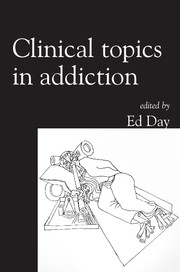Book contents
- Frontmatter
- Contents
- List of tables
- List of boxes
- List of figures
- List of contributors
- Foreword by Nat Wright
- Preface
- 1 What works in drug addiction?
- 2 The development of the drug treatment system in England
- 3 Stimulant use still going strong
- 4 Adverse effects of khat: a review
- 5 What the clinician needs to know about magic mushrooms
- 6 What works in alcohol use disorders?
- 7 Management of alcohol detoxification
- 8 Nicotine addiction and smoking cessation treatments
- 9 Pathological gambling: an overview of assessment and treatment
- 10 Use of investigations in the diagnosis and management of alcohol use disorders
- 11 Laboratory investigations for assessment and management of drug problems
- 12 Pharmacotherapy in dual diagnosis
- 13 Dual diagnosis: management within a psychosocial context
- 14 Treating depression complicated by substance misuse
- 15 Treating anxiety complicated by substance misuse
- 16 An overview of psychological interventions for addictive behaviours
- 17 Motivational interviewing
- 18 Substance misuse in adolescents
- 19 Management of drug misuse in pregnancy
- 20 Intoxication and legal defences
- 21 Substance misuse and violence: the scope and limitations of forensic psychiatry's role
- 22 Literary and biographical perspectives on substance use
- Index
22 - Literary and biographical perspectives on substance use
Published online by Cambridge University Press: 02 January 2018
- Frontmatter
- Contents
- List of tables
- List of boxes
- List of figures
- List of contributors
- Foreword by Nat Wright
- Preface
- 1 What works in drug addiction?
- 2 The development of the drug treatment system in England
- 3 Stimulant use still going strong
- 4 Adverse effects of khat: a review
- 5 What the clinician needs to know about magic mushrooms
- 6 What works in alcohol use disorders?
- 7 Management of alcohol detoxification
- 8 Nicotine addiction and smoking cessation treatments
- 9 Pathological gambling: an overview of assessment and treatment
- 10 Use of investigations in the diagnosis and management of alcohol use disorders
- 11 Laboratory investigations for assessment and management of drug problems
- 12 Pharmacotherapy in dual diagnosis
- 13 Dual diagnosis: management within a psychosocial context
- 14 Treating depression complicated by substance misuse
- 15 Treating anxiety complicated by substance misuse
- 16 An overview of psychological interventions for addictive behaviours
- 17 Motivational interviewing
- 18 Substance misuse in adolescents
- 19 Management of drug misuse in pregnancy
- 20 Intoxication and legal defences
- 21 Substance misuse and violence: the scope and limitations of forensic psychiatry's role
- 22 Literary and biographical perspectives on substance use
- Index
Summary
Summary This chapter attempts to give a flavour of the influence that psychoactive substances have had on many authors and the literary process. It explores the idea of the narrative as it is applied to addictive disorders and gives a range of examples of writing about different substances that might enhance the reader's knowledge of current drug culture. The portrayal in literature of doctors with addictions is presented as a warning to psychiatrists. The authors hope to have demonstrated that literature can be a valuable tool in understanding the experience of drug and alcohol use and addiction.
The effects of psychoactive drugs have been closely linked to all forms of literature for as long as humans have been writing, but a review of the subject is currently very topical. Although the problems of alcohol have long been a theme covered by authors, other drugs have not been as well represented in mainstream publishing until the past few decades. However, the escalation of the drug problem in the Western world has had an influence on popular fiction and led to a rekindling of interest in an older literature that explored these themes. The work of the 19th-century Romantics and of the Beat Generation and counter-culture of the 1960s has been developed by the ‘chemical generation’, with ecstasy (methylenedioxymethamphetamine (MDMA)) joining the opiates, cocaine, cannabis, lysergic acid diethylamide (LSD) and amphetamines as a backdrop to popular fiction.
Writers and alcohol
Alcohol, in particular, has been strongly linked to creativity, and John Sutherland, a professor of English literature in London and a self-confessed ‘recovering drunk’, has written extensively in this area. His book Last Drink to LA (Sutherland, 2001)1 provides some literary signposts on the path to understanding alcohol addiction and describes his own experiences at Alcoholics Anonymous (AA). Through his attendance at AA meetings, Sutherland has come to see addicts primarily as storytellers, believing that ‘telling tales (most of them tall, many of them self-serving) is one of the few things that booze makes you good at’ (Sutherland, 2001: p. 73).
Analysis of the lives of many famous writers reveals evidence of heavy alcohol consumption, mental illness, physical disease, family breakdown, suicide and premature death (Post, 1994).
- Type
- Chapter
- Information
- Clinical Topics in Addiction , pp. 303 - 314Publisher: Royal College of PsychiatristsPrint publication year: 2007

